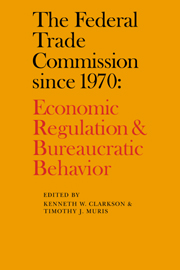Book contents
- Frontmatter
- Contents
- List of contributors
- Preface
- 1 Introduction
- Part I The institutional setting
- Part II Nature and consequence of FTC actions
- Introduction
- 6 Bureau of Competition: antitrust enforcement activities
- 7 Information for antitrust and business activity: line-of-business reporting
- 8 Industry structure investigations: Xerox's multiple patents and competition
- 9 Exclusionary practices: shopping center restrictive covenants
- 10 Legislative powers: FTC rule making
- 11 Rewriting consumer contracts: creditors' remedies
- 12 Regulating postpurchase relations: mobile homes
- 13 Regulating information: advertising overview
- 14 Special statutes: the structure and operation of the Magnuson-Moss Warranty Act
- Part III Conclusions and reforms
- Notes
- Selected bibliography
- Index
12 - Regulating postpurchase relations: mobile homes
Published online by Cambridge University Press: 05 November 2011
- Frontmatter
- Contents
- List of contributors
- Preface
- 1 Introduction
- Part I The institutional setting
- Part II Nature and consequence of FTC actions
- Introduction
- 6 Bureau of Competition: antitrust enforcement activities
- 7 Information for antitrust and business activity: line-of-business reporting
- 8 Industry structure investigations: Xerox's multiple patents and competition
- 9 Exclusionary practices: shopping center restrictive covenants
- 10 Legislative powers: FTC rule making
- 11 Rewriting consumer contracts: creditors' remedies
- 12 Regulating postpurchase relations: mobile homes
- 13 Regulating information: advertising overview
- 14 Special statutes: the structure and operation of the Magnuson-Moss Warranty Act
- Part III Conclusions and reforms
- Notes
- Selected bibliography
- Index
Summary
In May 1975, the Federal Trade Commission (FTC) proposed the Mobile Home Sales and Service Trade Regulation Rule (TRR). The TRR followed closely in form and substance the consent orders accepted on March 3 and 4, 1975, from four leading mobile home (MH) manufacturers.
The stated purpose of the TRR is to remedy the alleged failure of MH manufacturers and dealers to perform warranty service adequately. The most important provisions of the TRR require MH warrantors to establish procedures for performing warranty repairs within specified time limits (e.g., begin major repairs within three business days from date of notification), maintain records on warranty repairs, perform two on-site inspections (one before or at the time of tender of possession and another within 90 days thereafter), sign formal contracts with dealers and third parties delegated authority for warranty service, establish procedures for screening and monitoring dealers and third parties, and use disclaimers, limitations, labels, and certificates only as prescribed. If these provisions become law, failure to comply could entail fines of up to $10,000 per day per violation.
This chapter examines the rationale and the consequences of the proposed TRR. Section I contains a discussion of the evidence, the theoretical framework, and the value criteria used by the FTC in proposing the TRR. Section II contains an analysis of the nature and role of warranties, and Section III a description of the MH industry.
- Type
- Chapter
- Information
- The Federal Trade Commission since 1970Economic Regulation and Bureaucratic Behavior, pp. 204 - 221Publisher: Cambridge University PressPrint publication year: 1981

